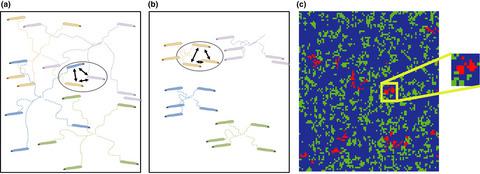当前位置:
X-MOL 学术
›
Ecol. Lett.
›
论文详情
Our official English website, www.x-mol.net, welcomes your
feedback! (Note: you will need to create a separate account there.)
Experimental evidence that local interactions select against selfish behaviour
Ecology Letters ( IF 7.6 ) Pub Date : 2021-03-23 , DOI: 10.1111/ele.13734 Mike Boots 1, 2 , Dylan Childs 3 , Jessica Crossmore 3 , Hannah Tidbury 3, 4 , Volker Rudolf 5
Ecology Letters ( IF 7.6 ) Pub Date : 2021-03-23 , DOI: 10.1111/ele.13734 Mike Boots 1, 2 , Dylan Childs 3 , Jessica Crossmore 3 , Hannah Tidbury 3, 4 , Volker Rudolf 5
Affiliation

|
How social behaviours evolve remains one of the most debated questions in evolutionary biology. An important theoretical prediction is that when organisms interact locally due to limited dispersal or strong social ties, the population structure that emerges may favour cooperation over antagonism. We carry out an experimental test of this theory by directly manipulating population spatial structure in an insect laboratory model system and measuring the impact on the evolution of the extreme selfish behaviour of cannibalism. We show that, as predicted by the theory, Indian meal moth larvae that evolved in environments with more limited dispersal are selected for lower rates of cannibalism. This is important because it demonstrates that local interactions select against selfish behaviour. Therefore, the ubiquitous variation in population structure that we see in nature is a simple mechanism that can help to explain the variation in selfish and cooperative behaviours that we see in nature.
中文翻译:

实验证据表明,局部互动会选择反对自私的行为
社会行为如何演变仍然是进化生物学中争议最大的问题之一。一个重要的理论预测是,当生物由于有限的传播或牢固的社会纽带而在本地相互作用时,出现的种群结构可能比对抗更有利于合作。我们通过在昆虫实验室模型系统中直接操纵种群空间结构并测量对自相残杀的极端自私行为的演变的影响,对该理论进行了实验测试。我们证明,正如该理论所预测的那样,选择了在分散性更有限的环境中进化的印度粕蛾幼虫来降低同类相食的发生率。这很重要,因为它表明本地互动会选择反对自私的行为。所以,
更新日期:2021-05-19
中文翻译:

实验证据表明,局部互动会选择反对自私的行为
社会行为如何演变仍然是进化生物学中争议最大的问题之一。一个重要的理论预测是,当生物由于有限的传播或牢固的社会纽带而在本地相互作用时,出现的种群结构可能比对抗更有利于合作。我们通过在昆虫实验室模型系统中直接操纵种群空间结构并测量对自相残杀的极端自私行为的演变的影响,对该理论进行了实验测试。我们证明,正如该理论所预测的那样,选择了在分散性更有限的环境中进化的印度粕蛾幼虫来降低同类相食的发生率。这很重要,因为它表明本地互动会选择反对自私的行为。所以,











































 京公网安备 11010802027423号
京公网安备 11010802027423号